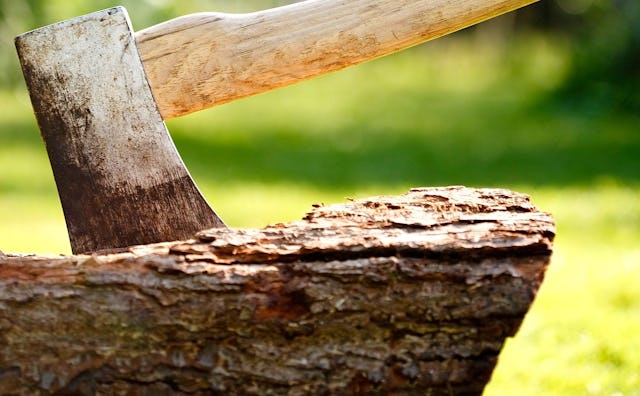What My Mother Taught Me About Splitting Wood

The ax was one of the only useful things my father left behind. But for that, and the saw, and we children, there was no trace of his—or of any man’s—ever having been there. Her tales of him were few, sharp splinters of stories. None of them spoke of love.
I picture myself at the kitchen window, watching her bend to the needling January wind, her knee braced against a chopping block, the dull edge of the ax embedded in a log, her arm rising and falling. And what comes to me is the vibrating thump, thump, thump of a log brought down against a scarred block, once, twice, three times before cleaving. Her jaw is locked, her brow the topography either of effort or of ire.
It is unclear whether she is wielding the ax to sever herself from something, or to beat out a futile call for help. It is not faulty memory that keeps the answer from me, but an early failing to wonder about her life at all. She’d been alone—inasmuch as she could ever be, with five young children—for as long as I could remember. She split wood. She sawed logs. We dragged downed limbs across cow-caked fields, each child according to his or her size, and she sawed them with the abandoned, brittle-toothed saw.
Cradling armfuls of split logs, she trudged indoors, bringing the damp in with her. She stacked the shattered wood against the range, and as it dried, it slowly gave up what was left of its nature, forgetting what it was to be whole.
I grew up to marry a man who split wood. When he was gone, which is to say, gone the way of my father, he left no ax. Not that I’d have used it if he had. I had only myself to warm. Once I was no longer in danger of marrying my father, I married again.
From my kitchen window, I watch my husband teach our preteen son to wield an ax. I cannot hear them, but I watch as their chilled breath merges in smoky clouds around them. I fear for my child. Not yet sturdy enough to hold the blade steady above his callow head, he is surely going to fell himself and be gone forever, never to grow fully into his own nature.
This is a lesson in becoming a man. But theirs is not a labor of necessity. It is no more essential than our fireplace, whose heat, though a soothing visual, is nothing more than a treat for snowy mornings spent lazing with the paper, mindless of both the profligacy and the blessing of letting a fire burn itself out, of survival independent of wood and ax.
It is many years since my mother taught me to split wood; almost as many since I’ve swung an ax myself. She is gone now. I have no idea what became of the ax. But I picture her still, wielding what my father left behind, making warmth from it. Or leaning before the small, tiled fireplace, her arms outstretched, pinioning in place a flimsy double page of newsprint, the toe of one worn shoe anchoring the paper against the grate. She is waiting for an updraft. Head bowed, she watches for the fire to catch, for an orange glow to grow to luminous yellow behind the page.
She is careful to pick her moment, that brief window in which the flame is strong enough to sustain itself but not so strong that it consumes the page. She aims to whip the paper away in a single, frantic movement, like the red cape whirled before a raging bull. Then she’ll step aside.
Sometimes, she misjudges, leaves the paper a moment too long, the faint smoldering at its center becoming a sudden conflagration, and her children, gathered behind her, waiting for heat, clutch at one another until she has wrestled the paper into the fire, where its stories from yesterday burn and turn to warmth and then to ash, the flakes so light they rise in the weightless pull of beyond.
This article was originally published on